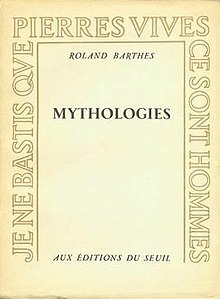Mythologies (book)

Cover of the first edition
|
|
| Author | Roland Barthes |
|---|---|
| Original title | Mythologies |
| Translator | Annette Lavers |
| Country | France |
| Language | French |
| Subject | Semiotics, Structuralism |
| Publisher | Les Lettres nouvelles |
|
Publication date
|
1957 |
|
Published in English
|
1972 |
Mythologies is a 1957 book by Roland Barthes. It is a collection of essays taken from Les Lettres nouvelles, examining the tendency of contemporary social value systems to create modern myths. Barthes also looks at the semiology of the process of myth creation, updating Ferdinand de Saussure's system of sign analysis by adding a second level where signs are elevated to the level of myth.
Mythologies is split into two: Mythologies and Myth Today, the first section consisting of a collection of essays on selected modern myths and the second further and general analysis of the concept.
The first section of Mythologies describes a selection of modern cultural phenomena, chosen for their status as modern myths and for the added meaning that has been conferred upon them. Each short chapter analyses one such myth, ranging from Einstein's Brain to Soap Powders and Detergents. They were originally written as a series of bi-monthly essays for the magazine Les Lettres Nouvelles.
In a typical example: Barthes describes the image that has been built up around Red Wine and how it has been adopted as a French national drink, how it is seen as a social equaliser and the drink of the proletariat, partly because it is seen as blood-like (as in Holy Communion) and points out that very little attention is paid to red wine's harmful effects to health, but that it is instead viewed as life-giving and refreshing- 'in cold weather, it is associated with all the myths of becoming warm, and at the height of summer, with all the images of shade, with all things cool and sparkling.'
In another chapter, Barthes explores the myth of professional wrestling. He describes how, unlike in boxing, the aim of the sport is not to discover who will win or 'a demonstration of excellence', it is a staged spectacle acting out society's basic concepts of Good and Evil, of 'Suffering, Defeat and Justice'. The wrestlers, like characters in a pantomime, portray grossly exaggerated stereotypes of human weakness: the traitor, the conceited one, the 'effeminate teddy-boy'. The audience expects to watch them suffer and be punished for their own transgressions of wrestling's rules in a theatrical version of Society's ideology of justice.
...
Wikipedia
